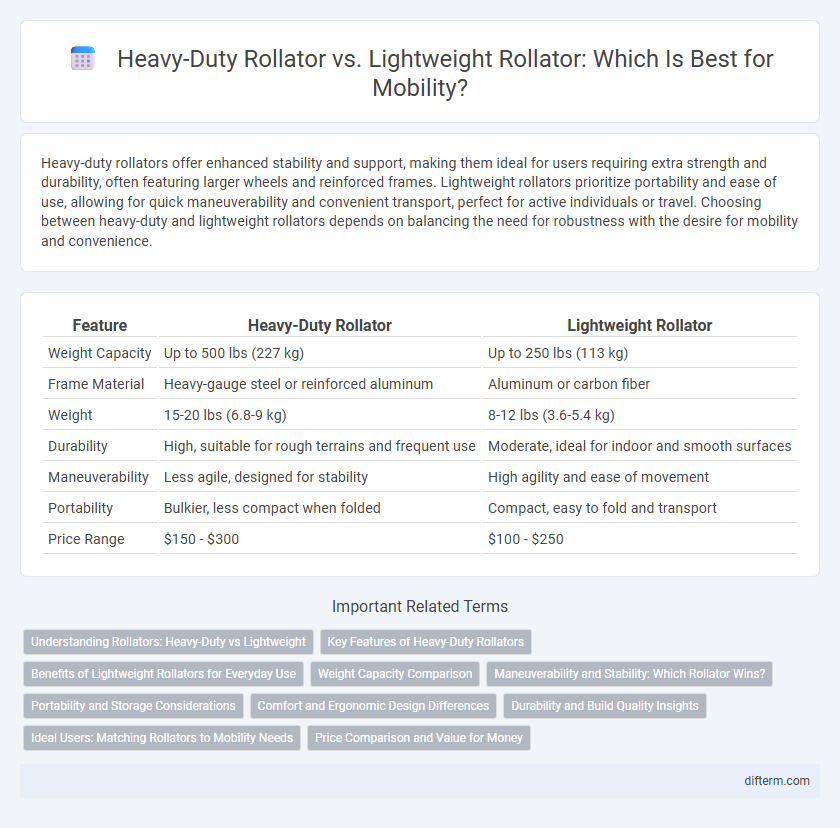Heavy-duty rollators offer enhanced stability and support, making them ideal for users requiring extra strength and durability, often featuring larger wheels and reinforced frames. Lightweight rollators prioritize portability and ease of use, allowing for quick maneuverability and convenient transport, perfect for active individuals or travel. Choosing between heavy-duty and lightweight rollators depends on balancing the need for robustness with the desire for mobility and convenience.
Table of Comparison
| Feature | Heavy-Duty Rollator | Lightweight Rollator |
|---|---|---|
| Weight Capacity | Up to 500 lbs (227 kg) | Up to 250 lbs (113 kg) |
| Frame Material | Heavy-gauge steel or reinforced aluminum | Aluminum or carbon fiber |
| Weight | 15-20 lbs (6.8-9 kg) | 8-12 lbs (3.6-5.4 kg) |
| Durability | High, suitable for rough terrains and frequent use | Moderate, ideal for indoor and smooth surfaces |
| Maneuverability | Less agile, designed for stability | High agility and ease of movement |
| Portability | Bulkier, less compact when folded | Compact, easy to fold and transport |
| Price Range | $150 - $300 | $100 - $250 |
Understanding Rollators: Heavy-Duty vs Lightweight
Heavy-duty rollators offer enhanced durability and higher weight capacity, typically supporting up to 500 pounds, making them suitable for users requiring robust stability and strength. Lightweight rollators, often constructed from aluminum or carbon fiber, prioritize portability and ease of maneuverability with weight capacities around 250 to 300 pounds. Selecting between heavy-duty and lightweight rollators depends on individual mobility needs, body weight, and the environment in which the rollator will be used.
Key Features of Heavy-Duty Rollators
Heavy-duty rollators feature reinforced steel or aluminum frames designed to support weights up to 500 pounds, providing enhanced stability for users with greater mobility needs. These rollators include wider seats, larger wheels (typically 8 to 10 inches) for improved terrain navigation, and durable brakes for reliable safety control. Equipped with padded armrests and extra storage options, heavy-duty rollators offer superior comfort and convenience compared to lightweight models.
Benefits of Lightweight Rollators for Everyday Use
Lightweight rollators offer enhanced portability and ease of maneuverability, making them ideal for everyday use in various environments. Their reduced weight minimizes physical strain on users, promoting greater independence and comfort during mobility tasks. Compact design and user-friendly features ensure convenient storage and transport, optimizing daily mobility support for active lifestyles.
Weight Capacity Comparison
Heavy-duty rollators typically support weight capacities ranging from 300 to 500 pounds, making them suitable for users requiring extra durability and stability. Lightweight rollators generally accommodate weights between 200 and 300 pounds, prioritizing portability and ease of use over maximum load support. Selecting the appropriate rollator weight capacity ensures optimal safety and comfort tailored to individual mobility needs.
Maneuverability and Stability: Which Rollator Wins?
Heavy-duty rollators excel in stability with reinforced frames and larger wheels, providing robust support on uneven terrain and for users with greater weight needs. Lightweight rollators offer superior maneuverability due to their compact design and smaller wheels, ideal for indoor use and tight spaces. The choice depends on whether stability or ease of movement in confined areas is the priority for the user.
Portability and Storage Considerations
Heavy-duty rollators offer enhanced stability and weight capacity but tend to be bulkier and heavier, making them less portable and more challenging to store in confined spaces. Lightweight rollators prioritize ease of transport and compact storage, often featuring foldable frames and smaller footprints ideal for travel and limited home environments. Choosing between the two depends on balancing the need for durability and support against convenience in portability and storage efficiency.
Comfort and Ergonomic Design Differences
Heavy-duty rollators feature reinforced frames and wider seats designed to support users up to 500 pounds, ensuring enhanced comfort and stability for larger individuals. Lightweight rollators prioritize portability with slim, ergonomic frames made from aluminum, offering easier maneuverability and reduced fatigue during extended use. The ergonomic handles on heavy-duty models often include extra cushioning and adjustable height to accommodate different body types, while lightweight variants emphasize compact design and quick folding mechanisms for convenience.
Durability and Build Quality Insights
Heavy-duty rollators feature reinforced aluminum or steel frames, ensuring superior durability and stability for users requiring extra support. Lightweight rollators prioritize portability with materials like carbon fiber, sacrificing some robustness for ease of use and transport. High-quality build in heavy-duty models often includes industrial-grade wheels and enhanced braking systems, whereas lightweight versions focus on compact design and corrosion-resistant finishes.
Ideal Users: Matching Rollators to Mobility Needs
Heavy-duty rollators are ideal for users requiring enhanced stability and support, such as individuals with higher weight capacity needs or limited upper body strength, offering robust frames and larger wheels for rough terrain. Lightweight rollators suit active users or those with moderate mobility challenges who prioritize portability and ease of handling, featuring compact designs and reduced weight to facilitate indoor and outdoor use. Selecting the right rollator aligns with personalized mobility requirements, ensuring safety, comfort, and improved mobility assistance.
Price Comparison and Value for Money
Heavy-duty rollators typically cost between $150 and $350, offering enhanced durability and higher weight capacity, making them a valuable investment for users requiring robust support. Lightweight rollators generally range from $100 to $250, prioritizing portability and ease of use but may compromise on strength and longevity. Evaluating price against features, heavy-duty rollators deliver better long-term value for users with heavier mobility needs, while lightweight models suit occasional or travel use without a significant financial outlay.
heavy-duty rollator vs lightweight rollator Infographic

 difterm.com
difterm.com